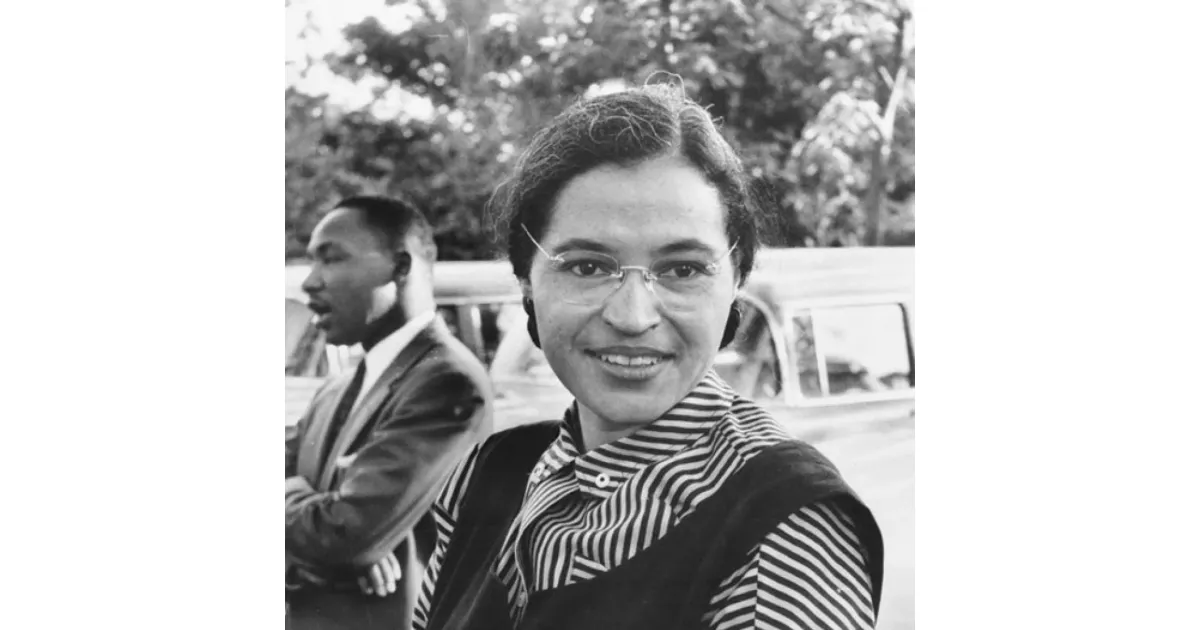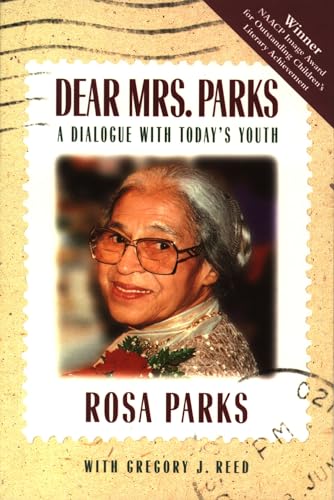From career breakthroughs to professional milestones, explore how Rosa Parks made an impact.
Rosa Parks, an American civil rights activist, is renowned for her courageous act in 1955 when she refused to give up her bus seat to a white passenger in Montgomery, Alabama. This act of defiance against the Jim Crow segregation laws ignited the Montgomery bus boycott, a pivotal event in the Civil Rights Movement. Often called the 'mother of the civil rights movement,' Parks's bravery and commitment to equality helped catalyze widespread efforts to end racial segregation and discrimination in the United States, making her a significant figure in American history.
1941: Began working at Maxwell Air Force Base
In 1941, Rosa Parks began working at Maxwell Air Force Base, where she experienced integrated public transit on-base, contrasting with the segregated buses she had to use at home.
December 1943: Elected Secretary of the NAACP
In December 1943, Rosa Parks was elected secretary of the Montgomery chapter of the National Association for the Advancement of Colored People (NAACP).
1943: Joined NAACP and attempted to register to vote
In 1943, Rosa Parks joined the Montgomery chapter of the National Association for the Advancement of Colored People (NAACP) and served as the organization's secretary. Also in 1943, Rosa Parks began her attempts to register to vote.
1944: Investigated Recy Taylor's gang rape
In 1944, Rosa Parks, in her capacity as NAACP secretary, began investigating the gang rape of Recy Taylor, a Black woman from Abbeville.
1952: Organized support for Jeremiah Reeves
In 1952, Rosa Parks organized support for Jeremiah Reeves, who was accused of raping a white woman. Reeves was ultimately executed in 1957.
1954: Began working for the Durrs
In 1954, Rosa Parks began working as a seamstress for Clifford and Virginia Durr, a white couple who were politically liberal and opposed to segregation.
December 5, 1955: Montgomery Bus Boycott Planning and Parks's Trial
On December 5, 1955, the day of Rosa Parks's trial, the Women's Political Council (WPC) planned a one-day boycott of Montgomery buses. Jo Ann Robinson collaborated with students to produce 35,000 leaflets announcing the boycott using a mimeograph provided by the college's business chair, John Cannon.
1955: Refusal to move on bus sparks boycott
In 1955, Rosa Parks refused to give up her seat to a white passenger on a bus in Montgomery, Alabama, violating Jim Crow laws. This act of defiance led to her arrest and sparked the Montgomery bus boycott, a pivotal event in the civil rights movement.
1955: Arrest and Bus Boycott
In 1955, Rosa Parks was arrested for refusing to give up her seat on a bus, leading to a widespread boycott organized by the Women's Political Council (WPC) and the Montgomery Improvement Association (MIA). The boycott, which lasted 381 days, ended after segregation on buses was deemed unconstitutional in the court case Browder v. Gayle.
January 1956: Fired from Montgomery Fair
In January 1956, Rosa Parks was fired from her job as a seamstress at Montgomery Fair because of her involvement in the bus boycott. She was being ostracized by her coworkers.
December 20, 1956: Supreme Court Orders Integration of Montgomery Buses
On December 20, 1956, the Supreme Court ordered the integration of Montgomery's buses after rejecting appeals by the city of Montgomery and the state of Alabama. This ruling led King to call off the boycott that day, 381 days after it began.
1962: Parks attends SCLC convention in Birmingham, Alabama.
In 1962, Rosa Parks attended the Southern Christian Leadership Conference convention in Birmingham, Alabama. She was an honorary member of the SCLC.
August 1963: Parks Participates in the March on Washington
In August 1963, Rosa Parks traveled to Washington, D.C., to participate in the March on Washington, where she was honored alongside other prominent women in the civil rights struggle during the event's "Tribute to Women" segment.
1964: Parks Works on Conyers's Congressional Campaign
In 1964, Rosa Parks played a critical role in John Conyers's congressional campaign, persuading King to appear with Conyers. After Conyers was elected, he hired Parks as a secretary and receptionist for his congressional office in Detroit.
1965: Parks Joins Selma to Montgomery Marches
In 1965, Rosa Parks attended the Selma to Montgomery marches, joined the Lowndes County Freedom Organization, and supported the Freedom Now Party.
1968: Parks Participates in Black Power Movement
In 1968, Rosa Parks took part in the Black power movement, attending the Philadelphia Black power conference.
1972: Parks Attends National Black Political Convention
In 1972, Rosa Parks attended the National Black Political Convention in Gary, Indiana, and continued to support the Black power movement.
July 1975: Joanne Little Acquitted
In July 1975, Joanne Little was acquitted after a national outcry around her case. Rosa Parks played a key role in the establishment of the Detroit chapter of the Joanne Little Defense Committee, supporting Little, who was charged with killing her jailer while he was sexually assaulting her.
1981: Parks Supports Arrested Activists
In 1981, Rosa Parks wrote to attorney Chokwe Lumumba in support of arrested activists from the Black Liberation Army, the May 19th Communist Organization, the RNA, and Weather Underground.
1984: Parks Supports Jesse Jackson's Presidential Campaign
In 1984, Rosa Parks supported Jesse Jackson's presidential campaign.
1985: Parks runs for NAACP president
In 1985, Rosa Parks and Joe Madison unsuccessfully ran for president and vice president of the NAACP's Detroit chapter.
1987: Co-founded Institute for Self Development
In 1987, Rosa Parks co-founded the Rosa and Raymond Parks Institute for Self Development with Elaine Eason Steele.
1987: Parks co-founded the Rosa and Raymond Parks Institute for Self Development
In 1987, Rosa Parks co-founded the Rosa and Raymond Parks Institute for Self Development with Elaine Eason Steele. The institute aims to develop youth leaders' capabilities in advancing civil rights initiatives.
1988: Parks Speaks at Democratic National Convention
In 1988, Rosa Parks spoke on behalf of Jesse Jackson at the Democratic National Convention, supporting his presidential campaign.
1990: Called for Release of Nelson Mandela
In 1990, at a Washington, D.C., gala celebrating her birthday, Rosa Parks gave a speech calling for the release of anti-apartheid activist Nelson Mandela.
1992: Authored "Rosa Parks: My Story"
In 1992, Rosa Parks authored the autobiographical work, "Rosa Parks: My Story".
1994: Attended Meeting of National Coalition of Blacks for Reparations
In 1994, Rosa Parks attended the meeting of the National Coalition of Blacks for Reparations in America in Detroit alongside Jesse Jackson and Queen Mother Moore.
1995: Participated in Million Man March
In 1995, Rosa Parks participated in the Million Man March alongside Moore, Betty Shabazz, Dorothy Height, and Maya Angelou, at the invitation of Louis Farrakhan.
1997: Authored "Dear Mrs. Parks"
In 1997, Rosa Parks authored the autobiographical work, "Dear Mrs. Parks".
1999: Filmed Cameo Appearance for Touched by an Angel
In 1999, Rosa Parks filmed a cameo appearance for the television series Touched by an Angel.
2001: Signed Open Letter Cautioning Against Military Response
In 2001, following the September 11 attacks, Rosa Parks, along with Danny Glover, Harry Belafonte, and Gloria Steinem, signed an open letter that cautioned against a "military response" and advocated for international collaboration.
Mentioned in this timeline

Nicki Minaj born Onika Tanya Maraj-Petty is a highly influential...

Martin Luther King Jr was a pivotal leader in the...
Barbie is a fashion doll created by Ruth Handler and...
Germany officially the Federal Republic of Germany is a nation...

Inflation in economics signifies an increase in the average price...
Virginia a state in the Southeastern and Mid-Atlantic US lies...
Trending

28 minutes ago Clara Tauson Dominates Linette in Dubai, Secures WTA 1000 Quarterfinal Spot

28 minutes ago Pegula Defeats Jovic, Advances to Dubai Quarterfinals; Set to Face Tauson
28 minutes ago Toyota Supra and Lexus LC May Share Platform for Next Generation Models
29 minutes ago Alaska Airlines pilots get shocking pay raises, reshaping network and margins.
29 minutes ago Ramadan 2026 Timetable: Fasting Hours, Suhoor, and Iftar Times Worldwide Confirmed.
1 hour ago Ski Mountaineering to Debut at Milan-Cortina Winter Olympics in 2026.
Popular

Jesse Jackson is an American civil rights activist politician and...
Randall Adam Fine is an American politician a Republican who...

Pam Bondi is an American attorney lobbyist and politician currently...

Barack Obama the th U S President - was the...

Martin Luther King Jr was a pivotal leader in the...

Ken Paxton is an American politician and lawyer serving as...


